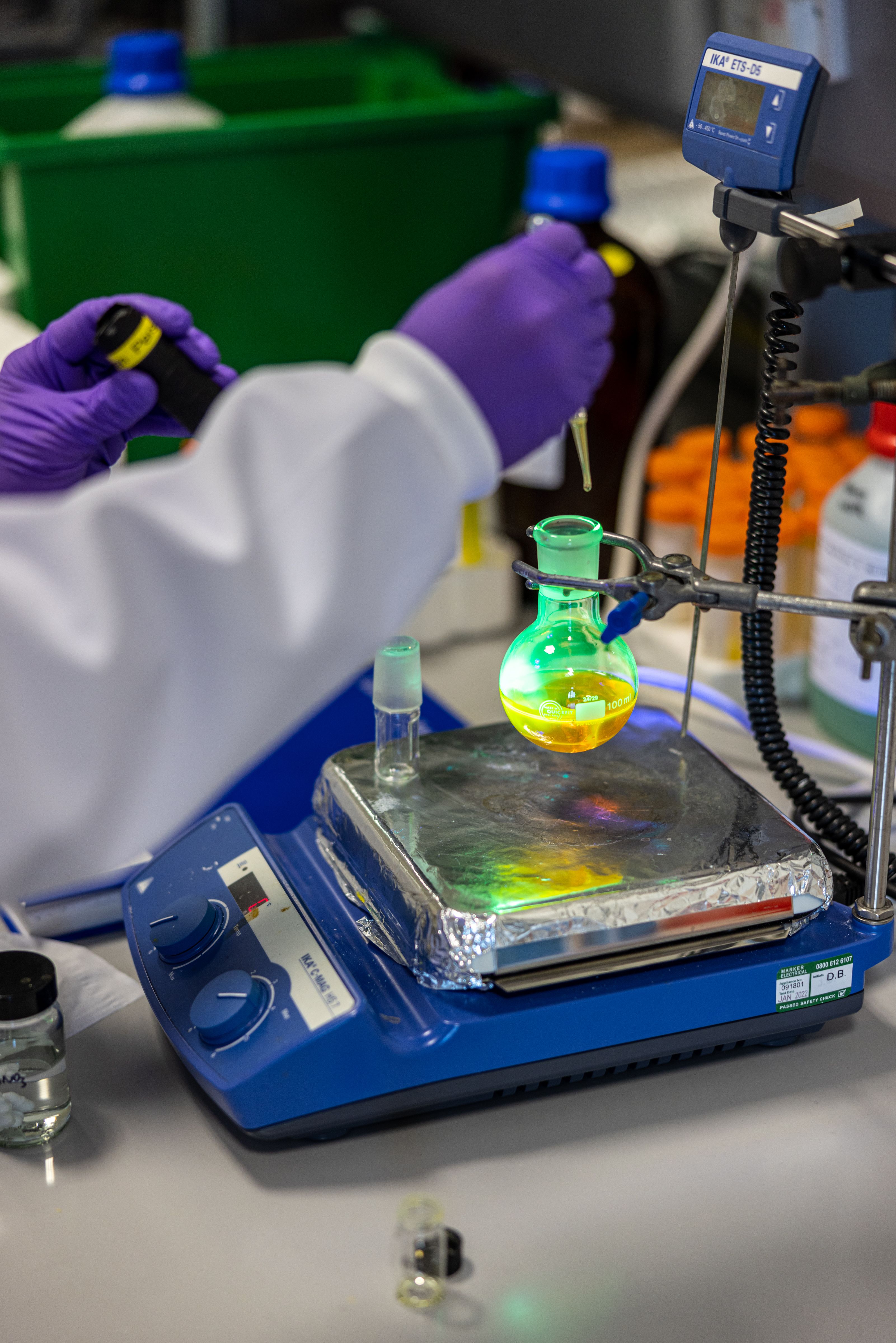MPhil by Research
One-year research degree that gives you the opportunity to develop expertise relevant to your area of interest

The Department offers a one-year MPhil by research degree, which is formally known as the 'MPhil in Chemical Engineering and Biotechnology'.
The MPhil is a research-based degree, and it gives you the opportunity to develop expertise relevant to your area of interest. Applicants are advised that almost without exception students commence their MPhil studies with the intention of later applying to pursue the higher degree. Please note, however, that the degree does not 'convert' to a PhD; students wishing to later pursue a PhD must make a new application for PhD study.
Students progress their research projects under academic supervision for one year, and at the conclusion of their studies are examined by thesis and oral examination. Prospective students are invited to consider their research interests in the light of the specialisms of our senior academics and the department’s on-going research activities.
Postgraduate Admissions Timeline
3-12 months before formal application
- Review our Research Groups webpage to determine the Department’s current areas of research
- For those interested in our research-based MPhil or part-time PhD study, review the groups who are currently able to consider such applications.
- Make informal contact with the group head before making a formal application; guidance on what you should include in your initial contact is on our PhD page (relevant also for MPhil applicants).
Early September
- Typically between the 1st and 15th the Admissions Portal will open for applicants. Refer to Postgraduate Prospectus for more up to date information.
- Deadline for US Gates applications is normally early October.*
* Confirm all funding & application deadlines on the University of Cambridge's Postgraduate Prospectus and Funding Portal
December
- Deadline for the main University Funding Competition, e.g., Cambridge Trust, Gates (International), etc.
- Deadline for PhDs and research-based MPhils in Chemical Engineering and Biotechnology (our research-based MPhil) is normally early December.*
* Confirm all funding & application deadlines on the University of Cambridge's Postgraduate Prospectus and Funding Portal
January - May
- We will continue to accept applications for admission through the Michaelmas and Lent Term applications deadlines.
- Funding outcomes normally announced during this period, but some may take longer.
End of July
Applicant Portal Closes for Lent Term Applications
Accepted students for Michaelmas need to meet their offer conditions.
Postgraduate Admissions Timeline
Entry requirements
You are normally expected to hold, or to be about to achieve, a First Class or high 2.i Honours Degree (or the equivalent from an overseas institution, please see the International Qualifications page) in chemical engineering, engineering, chemistry, biochemistry, applied mathematics, physics, biological science or related subjects. Alternatively, candidates with an appropriate Master's qualification may be considered, but please be advised that we would still normally expect a First Class or high 2.i Honours (or overseas equivalent) undergraduate degree. The admissions manager initially screens applications to ensure that all essential information is provided.
Applications
Before making a formal application for this course, please consult the list below of groups that are able to take on 1-year research students; only academics/groups listed are able to accept applications our MPhil in Chemical Engineering and Biotechnology course.
Proposed Supervisor, title of research and research summary
Before choosing a research area, please see the Department's Research Group page to become familiar with our current research and to see the number of available PhD and MPhil student positions available. Prospective applicants are expected to contact potential supervisors before applying. The purpose of this initial contact is to understand the process, develop an application, and enquire on a supervisor’s capacity and willingness to supervise/see if there is a good fit between your interests and theirs. When you contact a supervisor, please be sure to include your CV, a statement of your research interests/proposal, and any other relevant materials.
Before applying, please carefully review the information available on our website; familiarize yourself with the work conducted by our department and the research interests and projects of potential supervisors. This will help you identify the academic staff whose expertise aligns with your own research interests. In your proposal, demonstrate your familiarity with related academic work in the field. Identify and describe a novel research direction, considering why it is both interesting and relevant to pursue research in that particular area. Write clearly and concisely. Your proposal should be approximately 300 words and written in English. Structure your proposal with sections such as introduction, prior research/gaps, problem/proposed research, and methodologies. Provide some specific details of what is expected of each section. Demonstrate feasibility and an anticipated plan/schedule of work for the first year. Strive for precision in what you intend to do in your MPhil.
Please note that the department has a policy of rejecting unsolicited applications—those that do not mention a specific supervisor and provide a research proposal. Therefore, it is crucial for prospective students to first identify a potential supervisor. When reaching out to a supervisor, include a brief statement outlining what excites you about their research and why you believe you are an ideal candidate for that particular field.
Once you have successfully engaged the interest of a supervisor, most will be willing to assist in crafting a strong MPhil application and can offer advice on funding opportunities. They can also write a letter of support for your application should your marks be below the high 2:1 level, but they find you have the right skills to complete a MPhil in their group.
If a supervisor does not respond to your emails, do not take it personally. Some supervisors are extremely busy and receive numerous inquiries, often having only one or two spots available in their group. Continue searching for a good match. The busiest supervisor may not necessarily be the best fit for you.
When you are ready to apply, you must enter the name of a prospective supervisor and a research proposal; we are unable to consider applications without them. A degree of flexibility on both sides (the department and you) is helpful. Students frequently come to the department and work in a slightly different area to their original preference.
Further information
The University Postgraduate Prospectus provides comprehensive information about the course, the admissions process, application deadlines, tuition fees and other costs. Occasionally studentships may be available for highly qualified applicants, covering tuition fees and maintenance costs for eligible students.
Research groups
Groups/academics accepting applications* for the MPhil in Chemical Engineering and Biotechnology course (*availability can change over the course of the year; please contact the group head in the first instance):
Sebastian Ahnert’s group -- Structural Complexity
Graham Christie’s group -- Molecular Microbiology
Lorenzo Di Michele’s group -- Artificial Cells, Soft Matter and DNA Nanotechnology
Shelly Grizbon-Singh’s group -- Computational BioFluid Mechanics
Clemens Kaminski’s group -- Laser Analytics Group
Gabi Kaminski’s group -- Molecular Neuroscience
Markus Kraft’s group -- Computational Modelling
Alexei Lapkin’s group -- Sustainable Reaction Engineering
Ewa Marek's group -- Energy Reactions and Carriers
Geoff Moggridge’s group – Structured Materials Group
Róisín Owen’s group -- Bioelectronic Systems Technology
Sam Stranks’ group -- Optoelectronic Materials and Device Spectroscopy
Ian Wilson’s group -- Particles, Soft Solids and Surfaces
Axel Zeitler’s group -- Terahertz Applications
© Martin Bond
© Martin Bond
Back to study with us
Explore our undergraduate course, taught postgraduate programmes, and research opportunities.
Driven by curiosity. Driving change.
University quick links
UniofCam Microsoft Office 365
CamBridgeSens
CamCORS
CamSIS
Lookup Service
Moodle
Contact us
Department of Chemical Engineering and Biotechnology
Cambridge West
Philippa Fawcett Drive
Cambridge
CB3 0AS
Tel: +44 (0)1223 748999



